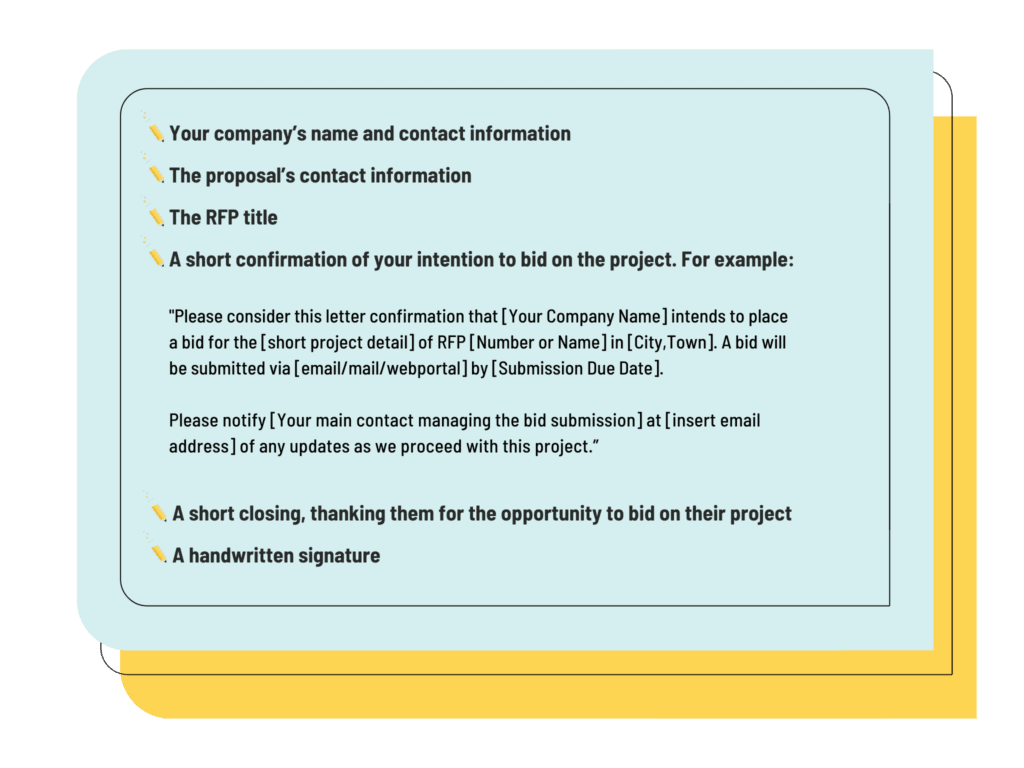What Is a Letter of Intent to Bid?


A Letter of Intent to Bid isn’t always a required RFP document but may be one your organization considers implementing into your response process. You may be asking why you should bother with it if it isn’t required. After all, RFPs have enough requirements all on their own! So, let’s dig in.
Imagine your business intends to respond to a Department of Defense RFP that’s not due for four weeks or maybe longer. Especially when dealing with larger government contracts, there are myriad reasons why delays or changes in their procurement process may occur. In turn, these changes directly affect your response and associated effort. It will make all the difference to your team’s response management process if you’re notified of amendments as they happen, especially when time and money are at stake!

What Is a Letter of Intent to Bid?
A Letter of Intent to Bid (or LOI for short) is a very simple business letter a vendor sends to the RFP’s procurement contact notifying them of your “intention to bid” on their RFP. LOIs are also referred to as a Statement of Intent or Statement of Interest (these are used interchangeably but have their own places within the RFP process). However, the LOI step happens after your team thoroughly reviews the RFP and knows you can fully comply with the RFP requirements.
It’s important to note that an LOI isn’t necessary for vendors to send for every RFP. Rather, they’re best for large contracts, typically for agencies with longer timelines, various phases, and numerous meetings or conferences. Then, there will be question and answer periods. Basically, send an LOI for any RFP that you want to ensure you have all available information for to avoid any misunderstandings or miscommunication prior to submitting a response. And definitely send a LOI if the RFP vendor is specifically requesting one!
When Is a LOI Required?
Procurement offices might require vendors to submit an LOI to help them gauge the level of interest in the RFP.
Government agencies must follow strict procurement guidelines when spending taxpayer dollars. To further this, the agency must have a specific number of vendors interested in responding to their RFP to ascertain competition and ensure that all vendors get fair consideration. By requiring an LOI from vendors, the agency can make an educated decision on whether to continue the RFP process if enough interest is received. Alternatively, if not enough vendors show interest, this allows the agency to save time and resources by pausing the procurement process sooner rather than later.
How to Write a LOI
Sometimes, when LOIs are a requirement, agencies will provide Letter of Intent templates for vendors to fill out and then submit. Many other times, it’s up to the vendor to create the letter. But don’t fret! The LOI is probably the simplest document a vendor can provide as part of the RFP process. The letter confirms to the agency that your company intends to bid on a specific project. Ultimately, the letter formally requests that the agency notify your company of any updates before the required due date.
Using proper business letter formatting, your letter of intent should include:

It’s that simple! Keep in mind that the LOI should not be used to ask questions or include information on how your company plans to respond to its RFP. All of those details will have their opportunity to shine during the remainder of the response process. It is also a good idea to keep your Letter of Intent focused and succinct. Therefore, this letter should be no longer than one page.
Finally, including an LOI at the beginning stages of an RFP response can help you stay ahead of the competition. Ensure your business stands out by expressing an interest early in the procurement. When the procurement team evaluates responses, they’ll already know your company. That’s why we always recommend including an LOI. It’s a simple step that will help your proposal go the extra mile.
Now, all you have to do is write the RFP. But, don’t worry! We’ve got your back.
Looking to Stand Out?
The Bid Lab helps small and medium-sized businesses win big opportunities within the procurement world. For more pointers about how to write a winning bid, learn the dos and don’ts of writing RFP cover letters and organize a successful executive summary. We help your business stand out by implementing our tried-and-true methods to organize your data, processes and people. So, contact The Bid Lab today to see how we can make your experience a positive and informative one! Reach out for a free consultation by calling 1-844-4BIDLAB or emailing respond@thebidlab.com.
